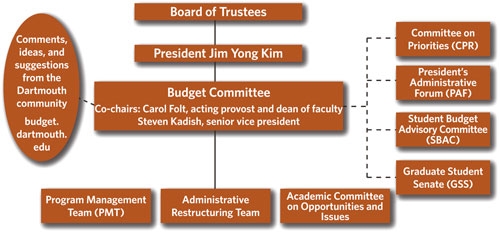Budget Committee Chairs Outline Process, Request Community Feedback
President Jim Yong Kim will host the second open forum on Dartmouth’s Strategic Budget Reduction and Investment (SBRI) effort on Friday, January 15, from 12:30 to 2 p.m. Watch Dartmouth Daily Updates for additional details. The forum is part of the ongoing effort to share information and get community feedback on the SBRI effort. Budget Committee co-chairs Carol Folt, acting provost and the dean of the Faculty of Arts and Sciences, and Steven Kadish, senior vice president, will also participate.To address a structural imbalance in the College’s budget, Dartmouth is mobilizing to identify cost-savings and additional revenue totaling $50 million in fiscal year 2010 and another $50 million in fiscal year 2011.
In a December 11 message to the community, Folt and Kadish outlined the process. “The goal for our Strategic Budget Reduction and Investment effort is to make sure that Dartmouth continues to excel at accomplishing its mission, as we invest in our vision to achieve global leadership in higher education.”
The Budget Committee is now reviewing initiatives for the current fiscal year, as well as recommendations for the February 6 and 7 meeting of the Board of Trustees. Additional recommendations will be made to the Board at its spring-term meeting April 10 and 11. Cost-savings, revenue, and investment measures will be reviewed and approved by President Jim Yong Kim and the Board. Implementation will be ongoing.

Folt and Kadish outlined the structure for the SBRI, emphasizing that the work is being undertaken institution-wide. (See SBRI organizational chart above.) “The Board of Trustees approves the budget and its spending and revenue actions,” Folt and Kadish wrote. “President Kim prepares and presents the budget recommendation to the Board of Trustees.” The 20-member Budget Committee is “the main driver of the SBRI effort,” coordinating proposals, analyzing information, providing oversight for initiatives, and making recommendations for President Kim and the Board to review.
The Budget Committee has three subcommittees, including a Program Management Team, an Administrative Restructuring Team, and the Academic Committee on Opportunities and Issues. Click here to read more about the focus and members of the SBRI committees.
Ideas and suggestions from the Dartmouth community are informing the work of the Budget Committee. Additionally, the group is in close contact with departments and divisions, as well as the Committee on Priorities, the President’s Administrative Forum, the Student Budget Advisory Committee, and the Graduate Student Senate.
Folt and Kadish welcome suggestions regarding the College’s budget. “We continue to be genuinely impressed with the thoughtfulness, ingenuity, and passion of our colleagues and all members of the Dartmouth community as we tackle this challenge,” wrote Folt and Kadish. Submit comments online by clicking here.
Contribute
Below are 10 broad themes that have emerged from the more than 700 ideas shared to date.- Reduce the cost of employee salaries and benefits (salary freezes, furloughs, early retirement, buyouts, reductions in hours, pay cuts, 10- and 11-month contracts, less support for professional development, renegotiate health insurance).
- Save on energy costs through more efficient use of the College’s buildings.
- Increase administrative efficiency (consolidate similar functions, combine offices, sell or rent auxiliary operations, downsize or outsource where appropriate).
- Expand the College’s educational offerings (create a continuing education or distance learning program, expand the student body, offer more executive education).
- Increase fund-raising efforts and donations from new sources.
- Seek more federal funds and foundation grants for sponsored research.
- Reexamine the academic year (move to a semester calendar, close the College between Thanksgiving and winter break, bring more programs to campus in the summer).
- Negotiate volume discounts with vendors. Overhaul procurement operations.
- Transition most printed publications to electronic formats.
- Review financial aid policies. Reintroduce student loan expectation.

